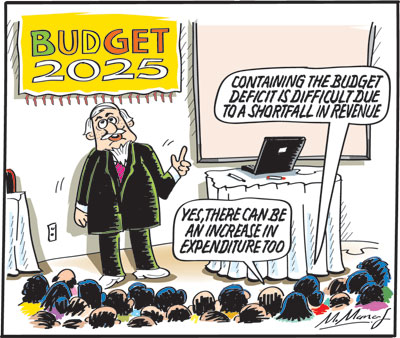Columns
Doubts, uncertainties and difficulties in achieving fiscal targets
View(s):As expected, the second reading of the 2025 budget was passed by a massive two-thirds majority in parliament last Tuesday. However, the critical issue is whether it would achieve the required fiscal deficit of less than 5 percent of GDP. There are doubts, uncertainties, and difficulties in achieving the fiscal targets.
Parliament
The parliamentary debate centred mostly around whether the budget kept the promises the NPP/JVP made in their manifesto, rather than whether the fiscal deficit would be contained to below 5 percent of GDP.
As to be expected, opposition MPs criticised the government for not increasing salaries and benefits that they themselves were unable to give. The opposition too had doubts about the government achieving its revenue targets.
Revenue and expenditure
In fact, there is a likelihood of shortfalls in revenue and expenditure overruns that would increase the budget deficit. This would necessitate increased revenue collection through higher taxation to comply with the IMF requirement to achieve a primary fiscal deficit (excluding interest payments) of less than 5 percent of GDP. (The budget aimed at a deficit of 4.3 percent of GDP.)
The critical issue is whether the government could reduce the fiscal deficit to below 5 percent of GDP as required by the IMF.
Doubts
There are growing doubts, uncertainties and difficulties in achieving the fiscal targets of the 2025 budget. This is especially so in view of predictions that the government may fall short of achieving the expected revenue of Rs 6.2 billion from increased duties on vehicle imports. The sale of government-owned luxury vehicles too may not bring in a significant revenue boost. However, some traders are of the view that there would be enhanced imports in spite of the increase in vehicle prices.

Expenditure
The containment of the primary deficit to 4.3 percent of the GDP is also difficult owing to likely overruns in public expenditure. The expenditure on subsidies is likely to exceed the budgeted amounts.
The expenditure allocated for health could also be inadequate. Additional taxation measures would be needed to meet overruns in expenditure.
Privatisation
The government’s decision to not privatise lossmaking state-owned enterprises (SOEs) would also add to government expenditure. This is especially so in respect of the losses of SriLankan Airlines and additional costs for increasing its fleet.
New taxes
While shortfalls in revenue are likely, government expenditures are also likely to exceed the budget figures. The decision not to privatise loss-making state-owned enterprises would increase government expenditure substantially. Consequently, there would be a need to introduce new taxes or increase the rates of taxation on consumer items.
Taxation
The expected property and wealth taxes too may have to be introduced to bridge revenue shortfalls. How will the government reduce tax avoidance and tax evasion? This is the crucial issue in fiscal reform.
The 2025 budget expects to achieve a fiscal deficit of 4.3 percent of GDP. The containment of the primary deficit to 4.3 percent of the GDP is unlikely owing to a likely shortfall in revenue. In addition, public expenditure too would exceed the budgeted amount. Therefore, additional taxation measures are needed. This shortfall has been mainly due to the revenue expected from import duties on vehicles being unlikely. The sale of government-owned luxury vehicles too would realise less than anticipated.
Concluding reflection
Achieving fiscal consolidation while meeting the aspirations of the people with a low proportion of people paying taxes is an impossible task. Furthermore, ideological factors that present pragmatic approaches make the task even more difficult. The international uncertainties too may add further difficulties.
Resolving the country’s economic problems is a formidable task. The popular expectations are, however, high that there would be increased public expenditure that would benefit people, while reduced taxation would provide relief to workers and professionals. Such a prospect is unlikely in an economy that is struggling to achieve economic stability while facing serious international uncertainties and external challenges.
The popular understanding and expectations of the budget and our politics are not conducive to achieving fiscal consolidation.
How the government manages state finances to achieve a fiscal deficit of less than 5 percent of GDP is to be seen in the coming months.
Buying or selling electronics has never been easier with the help of Hitad.lk! We, at Hitad.lk, hear your needs and endeavour to provide you with the perfect listings of electronics; because we have listings for nearly anything! Search for your favourite electronic items for sale on Hitad.lk today!


Leave a Reply
Post Comment